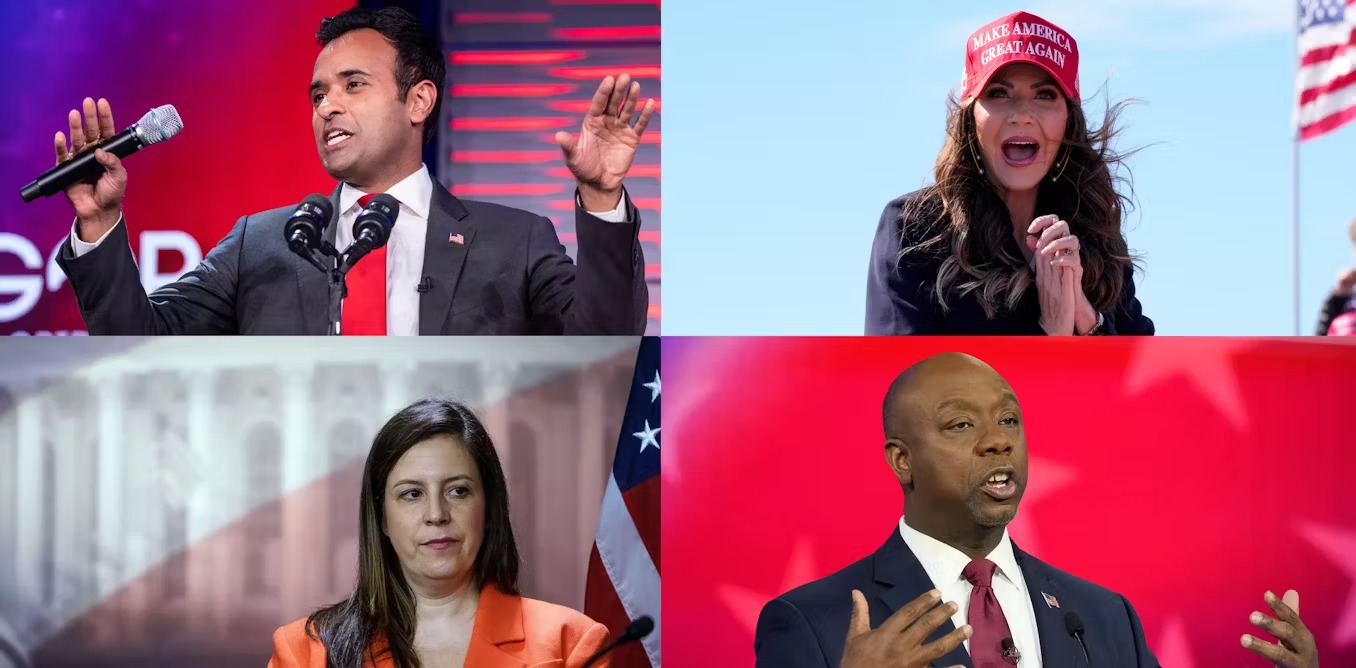Being second in line for leadership of the most powerful country in the world is not an easy job. But for Mike Pence, vice president under Donald Trump, things were even harder than usual.
As insurrectionists descended on the US Capitol on January 6, 2021, they had a specific target in mind – the outgoing vice president. They built a wooden gallows, and called out for him by name: “Hang Mike Pence! Hang Mike Pence!”
As the extensive congressional hearings into the insurrection later documented, the threats were not hollow. One informant told FBI investigators that “if given the chance”, certain far-right insurrectionists would have tried to kill him. Pence escaped with his life, but only just.
The insurrectionists, as a federal investigation alleges, were drawn to the Capitol by Trump, who had just lost the 2020 election to Joe Biden. They were after Trump’s VP because, as one later claimed, he had “betrayed” Trump by not refusing to certify the election results.
The job of vice president of the United States is not a normal one at the best of times. The person chosen to run alongside Trump in this year’s election will no doubt be keeping Pence’s experience in mind. It will likely be someone who can convincingly pledge undying loyalty to Trump. The former president – and his supporters – will expect nothing less.
Speculation over who that person might be is heating up, and Trump, as usual, is relishing drawing out the process in order to gain as much attention as possible. So, who – and how – will he choose?
Making race a priority
A vice presidential candidate is usually chosen based on a political calculation. For instance, the running mate can be seen to offset a presidential nominee’s weaknesses (be they real or perceived).
The relatively young northerner John F. Kennedy, for example, chose the much more politically experienced southerner, Lyndon B. Johnson. Barack Obama, running to be the first Black president, similarly chose the older and more experienced – and reassuringly white – Biden.
In his first run, Trump settled on Pence to offset his perceived weakness with evangelical voters – a critical mobilising base to any Republican candidate.
Viewed through this lens, the commonly accepted wisdom is that Trump has both a race and a woman problem, and that he should choose a VP candidate who can address at least one of those concerns.
In the first category, the leading candidates appear to be two men who ran against Trump for this year’s nomination – Tim Scott and Vivek Ramaswamy.
Scott – a South Carolinian that Bloomberg has dubbed “Trump’s New Black Best Friend” – is the only Black Republican in the Senate. He has certainly indicated he is keen for the job, professing his love for Trump and recently announcing his engagement (being single is generally regarded as a political liability).
This is election interference!
— Tim Scott (@votetimscott) March 25, 2024
If you believe in fairness and justice, you know this weaponization of justice against Donald Trump is disgusting. pic.twitter.com/qNm3NVPlyL
Trump would no doubt be pleased with such public professions of loyalty. But there is no indication Trump considers race to be a problem for his candidacy – in fact, quite the opposite.
Trump has been leaning in to increasingly extreme racist rhetoric. If he thought race mattered to his chances, he would likely be behaving differently. Trump’s political rise began with his racist “birther” conspiracies about Obama. It is not a stretch to suggest many of his supporters would baulk at a ticket that wasn’t entirely white.
Why a conservative woman might make sense
In the second category, the accepted wisdom is that Trump’s “woman problem” is a direct result of the signature achievement of his administration: the appointment of three conservative justices to the Supreme Court, which subsequently led to the overturning of Roe v Wade.
As Biden put it recently, candidates underestimate the political and electoral power of women at their peril.
Among the leading women Republican VP candidates are Elise Stefanik, a congresswoman from New York, and Kristi Noem, the governor of South Dakota.
The fact both are considered leading candidates reveals the political calculations behind Trump’s possible selection. While Trump has flip-flopped on abortion restrictions himself, both Stefanik and Noem have extremely conservative positions on reproductive rights.
Stefanik, a Catholic, has a strong track record of opposing abortion and voting for pro-life legislation.
— 🇺🇸 Alex deGrasse 🇺🇸 (@Degrasse81) June 24, 2021
“It is about human life, and protecting the most innocent among us." - @EliseStefanik https://t.co/EB2cly9Bdo
And given what we know about Trump’s views on women, it seems likely his judgement would be almost entirely aesthetic. There is a very specific political reason why Noem has grown out her hair and gotten new teeth.
Congresswomen Marjorie Taylor Green is often added to this list, but may have slimmer chances. While she literally wears her Trump loyalty on her head, she attracts a lot of attention. And Trump does not much like to share the spotlight.
It’s also entirely possible Trump will go with a wildcard candidate. He is increasingly resentful of what we could loosely characterise as “establishment” political advice designed to curb his worst instincts. His campaign is now almost entirely based on a desire for revenge and retribution against the people he believes held him back.
There has never been a reason to believe Trump will follow conventional political wisdom.
The stakes are higher than usual
Given the cult of personality that has developed around Trump, some argue his choice of running mate is unlikely to shift many votes. As a result, it doesn’t actually matter all that much.
Other keen watchers of American politics, though, argue the opposite. Given the advanced ages of both Trump and Biden, the VP pick is more important than usual, not least because of the higher-than-normal chance this person could be elevated to the Oval Office at some point.
In Trump’s case, some argue that if he wins, he will be a “lame duck” president from day one since it would be his second term in office. So, all eyes will be on his VP as the presumptive nominee for 2028.
This glosses over the very real questions about the continuity of constitutional law under a second Trump presidency, and ignores the noises Trump supporters are already making about trying to remove presidential term limits. It also assumes that, like Pence, Trump’s next VP would choose to put their own political future or American democracy above being an enthusiastic supporter of Trump’s authoritarianism. This is unlikely.
Like everything this time around, the stakes are higher than usual.



 Antonio José Seguro Poised for Landslide Win in Portugal Presidential Runoff
Antonio José Seguro Poised for Landslide Win in Portugal Presidential Runoff  US Pushes Ukraine-Russia Peace Talks Before Summer Amid Escalating Attacks
US Pushes Ukraine-Russia Peace Talks Before Summer Amid Escalating Attacks  Anutin’s Bhumjaithai Party Wins Thai Election, Signals Shift Toward Political Stability
Anutin’s Bhumjaithai Party Wins Thai Election, Signals Shift Toward Political Stability  Jack Lang Resigns as Head of Arab World Institute Amid Epstein Controversy
Jack Lang Resigns as Head of Arab World Institute Amid Epstein Controversy  FxWirePro- Major Crypto levels and bias summary
FxWirePro- Major Crypto levels and bias summary  U.S. to Begin Paying UN Dues as Financial Crisis Spurs Push for Reforms
U.S. to Begin Paying UN Dues as Financial Crisis Spurs Push for Reforms  Ohio Man Indicted for Alleged Threat Against Vice President JD Vance, Faces Additional Federal Charges
Ohio Man Indicted for Alleged Threat Against Vice President JD Vance, Faces Additional Federal Charges  Israel Approves West Bank Measures Expanding Settler Land Access
Israel Approves West Bank Measures Expanding Settler Land Access 

































